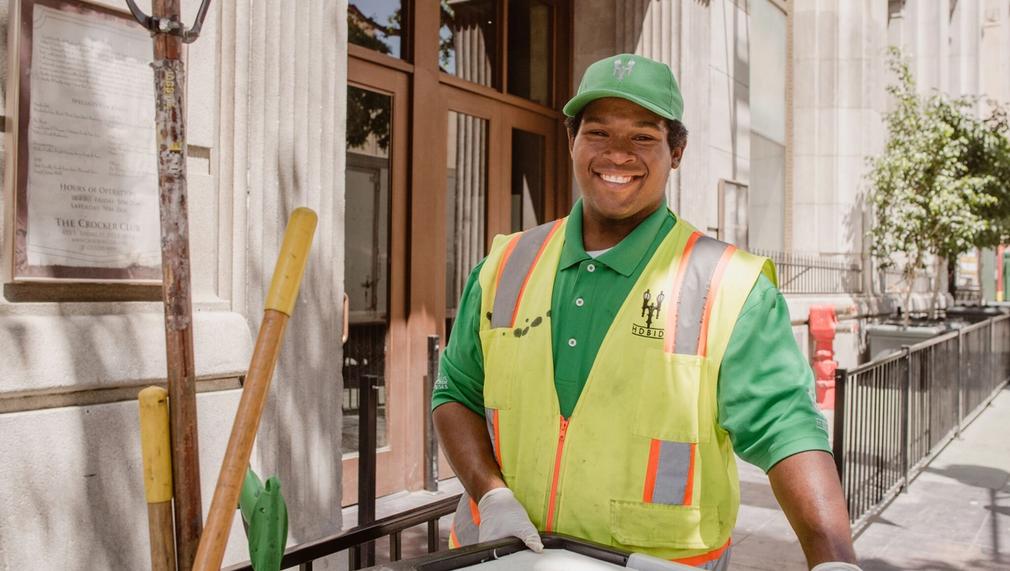Jobs for Justice: Support Chrysalis’ Reentry Initiatives
Chrysalis is the leading organization in LA focused on helping formerly incarcerated individuals attain self-sufficiency through work. Each year, through classes, supportive services, and our social enterprise “Chrysalis Enterprises” (CE), we provide comprehensive job readiness training and employment for over 1,600 participants in transitional jobs. We offer these motivated individuals, 81% of whom are justice-involved, and 72% of whom have past felony convictions, a second chance in life when they need it most.

In which areas of Los Angeles will you be directly working?
County of Los Angeles
What is the problem that you are seeking to address?
Over 60% of formerly incarcerated individuals are unemployed one year after release. Due in part to changes in public policy, as well as inmate releases since COVID-19 arrived, the number of ex-offenders in need of employment support as they reenter society has risen dramatically. Regardless of the efforts to plan for a seamless transition, reentering individuals face enormous challenges to establishing a pro-social lifestyle, including difficulty in finding and maintaining employment due to a lack of job search experience, education, vocational skills, and/or work history, as well as employers’ reluctance to hire those who have been involved in the justice system. In addition, the post-pandemic unemployment rate in LA County in February 2021 was 10.9%. Justice-involved people, already facing challenges in finding employment, will be competing in the job market with high numbers of recently unemployed people without criminal backgrounds.
Describe the project, program, or initiative that this grant will support to address the problem identified.
For clients with significant barriers to employment, Chrysalis offers paid, transitional employment with our in-house businesses to get them started on the road to permanent, outside employment. Transitional jobs deliver marketable experience and occupational skills while providing a closely supervised, supportive working environment that allows clients to demonstrate and practice their hard and soft skills. Chrysalis Enterprise Businesses include: • Chrysalis Works: a professional street maintenance company, providing work experience in trash and recycling pick-up, landscaping, graffiti removal, hauling, and street sweeping. • Chrysalis Roads: employs people with justice system involvement to do litter abatement and freeway maintenance with Caltrans. • Chrysalis Staffing: a temp to permanent staffing agency that allows clients to re-enter the job market through short-term, full-time, and part-time work assignments in administrative office support, property management, and janitorial services, among others Throughout the pandemic, our CE businesses have been deemed essential. We have even been able to identify new opportunities for transitional jobs, such as providing support for Project Roomkey Program, which is placing high-risk people experiencing homeless in hotels and motels during the COVID-19 crisis.
In what stage of innovation is this project, program, or initiative?
Expand existing project, program, or initiative
Approximately how many people will be impacted by this project, program, or initiative?
Direct Impact: 1,500
Indirect Impact: 5,000
Describe how Los Angeles County will be different if your work is successful.
If successful, Chrysalis will CREATE opportunities for over 1,100 formerly incarcerated people to reenter society, find work and get on the path to self-sufficiency during the grant year. Our approach to reentry is jobs. We are recognized leaders in the reentry community connecting people to employment and assisting people to increase their incomes. CE workers earn wages and pay taxes, reducing their recidivism rates and dependence on government assistance. They receive on-the-job training from supervisors with lived experience in homelessness and incarceration. And they are paired with an Employment Specialist, to support their job search throughout their transitional employment, helping to move them successfully into mainstream employment. Employment improves housing stability, increases self-esteem and sense of dignity, and creates better physical and mental health, while also setting in motion changes that have positive ripple effects on families, communities, and society.
What evidence do you have that this project, program, or initiative is or will be successful, and how will you define and measure success?
A steady job is a key step to a person’s transition out of poverty and onto a pathway to self-sufficiency. We define success as helping our formerly incarcerated clients succeed by becoming ready for a job, getting a job, and retaining their job for at least 6 months. A 2010 Mathematica Policy Research study showed that an adult with barriers to employment who can stay employed or in a program for 6 months will have improved employment and social outcomes for the long term. We measure success by collecting impact data about our programs and clients, including the number of clients 1) completing our program, 2) transitioning to outside, permanent jobs, 3) retaining employment for 6 months, and 4) wages earned. Data is collected from a variety of sources and tracked in our organization-wide database. We create a monthly dashboard, which tracks information about the services each client has accessed and the time it takes for clients to complete our program and find a job.
Which of the CREATE metrics will you impact?
Economic opportunities for formerly incarcerated
Indicate any additional LA2050 goals your project will impact.
LA is the healthiest place to LIVE